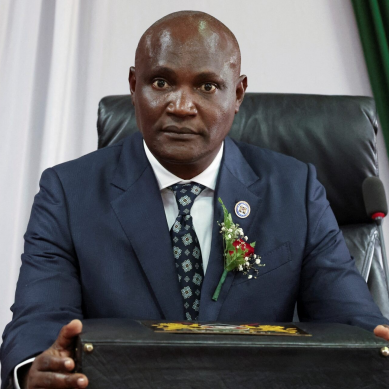Robbed of resources, brutalised by armed groups and ignored by UN, displaced millions in Congo report dire mental health crisis
Editor’s note: This story includes discussion of suicide. If you or someone you know needs help, the national suicide and crisis lifeline in the US is available by calling or texting 988. There is also an online chat at 988lifeline.org. Internationally, many governments and other organizations offer help and information on how to contact them is available online.
UN: 27m people in southern Africa go hungry as subregion endures worst hunger crisis due to El Niño
Scientists say sub-Saharan Africa is one of the most vulnerable parts of the world to climate change because of a high dependency on rain-fed agriculture and natural resources. Millions of African livelihoods depend on the climate, while poor countries are unable to finance climate-resilience measures.
Noble no more: End of era of hereditary aristocracy in Britain after 700 years of power entitlement
Britain’s Parliament has two chambers: the House of Commons, whose members are directly elected by voters in 650 constituencies across the UK; and the unelected Lords. For centuries it was made up of noblemen – women were not allowed until 1963 – whose voting rights were passed down to their children along with their titles. In the 1950s these were joined by “life peers” – retired politicians, civic leaders and other notables appointed by the government.
Deadly anti-depressants: Doctors ignore findings that the drugs work less by treating illness, more by changing personality
Eli Lilly, the manufacturer of Prozac, confirmed the drug had been blamed in over 75 criminal cases. The drugmaker said it was unaware of any cases in which the defence had succeeded. That’s precisely the problem, according to Healy. Today, nearly 20 years after Pittman’s case, no jury has acquitted a person who claimed antidepressants caused them to commit a murder.
How killing of Sikh separatist champion led to strained diplomatic relations between Canada and India
Hardeep Singh Nijjar was a local leader in what remains of a once-strong movement to create an independent Sikh homeland known as Khalistan. The Khalistan movement is banned in India, but has strong support among the Sikh diaspora, particularly in Canada.
Canada expels top India diplomats it accuses of organised crime and murder of Sikh leader Hardeep Singh Nijjar
India said it had asked six Canadian diplomats to leave by Saturday. The ministry also said it had summoned Acting High Commissioner in India Stewart Wheeler, currently Canada’s top diplomat in the South Asian country.
How Kenyan, Ugandan, Rwandan and South Sudanese women were duped with job offers in Russia only to end up building drones used in Ukraine war
Russia and Iran signed a $1.7 billion deal in 2022, after President Vladimir Putin invaded neighbouring Ukraine, and Moscow began using Iranian imports of the unmanned aerial vehicles or UAVs, in battle later that year.
Plans in high gear to make Italian-run space centre in Kenya to be used again for earth observation
Managed by Italian space agency ASI, the Luigi Broglio space centre is 30 kilometres (19 miles) north of Malindi and started its operations in the 1960s.
Kariba Dam: World’s largest man-made lake strips Zambia of electricity, grounds economy to a halt
Less than half of Zambia’s 20 million people had access to electricity before Kariba’s problems. Millions more have now been forced to adjust as mothers find different ways to cook for their families and children do their homework by candlelight. The most damaging impact is during the daylight hours when small businesses, the backbone of the country, struggle to operate.
How tamperproof blockchain technology is positioning crowdfunding to upstage traditional lenders in money market
Until 2016 when crowdfunding was deemed an online-based networking for social initiatives such building schools, churches, resource centres or roads, this method of fund-raising lacked legal basis to commute it to a source of investment capital for startups. Today, crowdfunding has kick-started a shift from traditional lenders and donors and pooling resources for economic investment for marginalised societies, non-governmental organisations and institutions devoid of political, cultural, religious or social rigidities that occasion a high a failure rate for even worthy causes.















